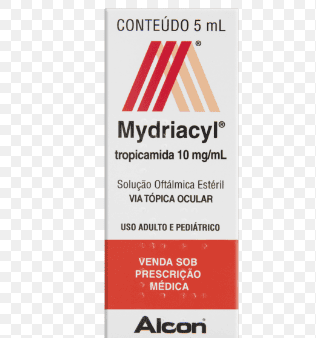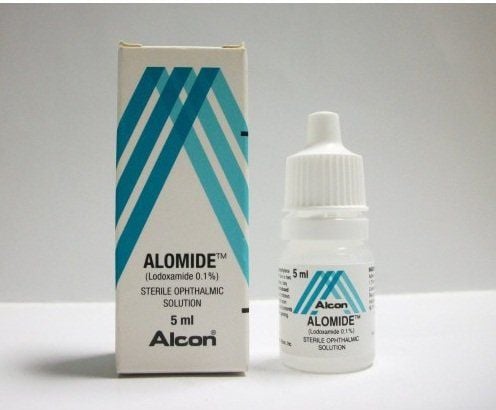This is an automatically translated article.
Mydriacyl is an eye drop that belongs to the class of anticholinergic drugs. It works to relax the eye muscles, dilate the pupils. To ensure effective treatment, patients need to use the drug as prescribed by the doctor.
1. Uses of the drug Mydriacyl
What does Mydriacyl do? It belongs to the class of anticholinergic drugs, which dilate the pupils of the eyes for examination. Mydriacyl works by relaxing certain eye muscles.
2. How to use Mydriacyl
To use the medicine, you need to wash your hands first. To avoid contamination, do not touch the tip of the dropper or let the tip of the tube touch your eyes or any other surface. If you wear contact lenses, you need to remove them before instilling the medicine.
When instilling, you tilt your head back, look up, pull down the lower eyelid. Holding the dropper over the eye, place 1-2 drops in the eye. The drops are usually instilled about 15-20 minutes before the eye exam. Then you look down, gently close your eyes for 1-2 minutes. Next, you put 1 finger in the corner of the eye (near the nose), gently press for 2-3 minutes to prevent the medicine from escaping. Be careful not to blink and not to rub your eyes. Repeat these steps for the other eye.
You should note that the Mydriacyl dropper should not be washed, and the cap should be changed after each use. If you are using another type of eye medication (drops or ointment), after using Mydriacyl eye drops, wait at least 5-10 minutes before using the other medication. In addition, you need to pay attention to use eye drops before applying eye ointment.
After using the medicine, you need to wash your hands. If giving medicine to a child, do not let the medicine fall into the child's mouth. Also, wash your child's hands after using Mydriacyl.

Thuốc Mydriacyl trước khi sử dụng cần rửa sạch tay
3. Side effects of the drug Mydriacyl
Some side effects when using Mydriacyl medicine are as follows:
Burning eyes, temporary blurred vision, dry mouth or light sensitive eyes. If these side effects persist or worsen, the patient should immediately notify the doctor; Serious side effects: Feeling of something in the eyes, heart palpitations, muscle stiffness, mood swings. When experiencing these side effects, the patient should immediately notify the doctor; Very serious side effects: Eye pain, eye swelling or redness, vision changes (eg seeing rainbow halos around light bulbs at night). Immediately notify the doctor if the patient experiences these side effects; Very serious allergic reactions to the drug are very rare. However, if you experience symptoms such as rash, itching, swelling (especially in the face, tongue or throat), dizziness or difficulty breathing, seek medical attention immediately. The above may not include all the possible side effects after taking Mydriacyl. If you experience other side effects not mentioned above, you should tell your doctor right away.
4. Notes when using Mydriacyl
Before using Mydriacyl, patients should tell their doctor if they are allergic to this medicine or to other types of allergies. The medicine may contain inactive ingredients and cause allergic reactions or other problems;
Before using Mydriacyl, the patient should inform his or her doctor about their personal or family medical history, especially with conditions such as glaucoma, high blood pressure, hyperthyroidism, cardiovascular disease (disease). coronary artery disease, irregular heartbeat), diabetes, Down syndrome, brain damage,...;
After taking Mydriacyl, your vision may be temporarily blurred. Therefore, you do not drive, operate machinery, or do any activity that requires clear vision until you can do so safely;
Mydriacyl may make your eyes more sensitive to light. Therefore, you should protect your eyes from bright sunlight, use sunglasses when outdoors;
Use caution when using Mydriacyl in the elderly and children because they are more sensitive to the effects of the drug, especially prone to mental and mood changes (agitation). During pregnancy, use Mydriacyl only when absolutely necessary. Be sure to discuss the benefits and risks of medication with your doctor. There is no evidence that Mydriacyl passes into breast milk while breastfeeding. Therefore, patients should consult their doctor before breast-feeding.

Những người bị dị ứng với các thành phần trong Mydriacyl cần hạn chế sử dụng
5. Mydriacyl drug interactions
Your doctor may already be aware of drug interactions and monitor them. Therefore, you should not start, stop taking, or change the dose of any medication before checking with your doctor.
Before using Mydriacyl, you should talk to your doctor about all the medicines you are taking, especially:
Antihistamines (diphenhydramine, meclizine); Antispasmodics (dicyclomine); certain antiarrhythmic drugs (quinidine); certain medications for Parkinson's disease (anticholinergics such as trihexyphenidyl); MAO inhibitors (isocarboxazid, linezolid, methylene blue, moclobemide, phenelzine, procarbazine, rasagiline, safinamide, selegiline, tranylcypromine) Other eye medications; Tricyclic antidepressants (amitriptyline). Note: Mydriacyl may be harmful if swallowed. If the drug overdose, serious symptoms such as shortness of breath or fainting, need to take the patient to the emergency room immediately. In addition, this medicine should not be shared with other people.
Mydriacyl medicine is stored at room temperature 20 - 25°C, away from direct light. You should not store the medicine in the refrigerator or in a high temperature environment. Close the lid of the medicine and keep it out of the reach of children or pets. When the drug has expired or is not needed, it should be disposed of according to the manufacturer's recommendations.
To avoid possible adverse reactions after using Mydriacyl medicine, patients need to take the medicine exactly as directed by the doctor. If you experience some of the side effects mentioned above, you should immediately notify your doctor for timely treatment.
Please dial HOTLINE for more information or register for an appointment HERE. Download MyVinmec app to make appointments faster and to manage your bookings easily.
Reference source: webmd.com













